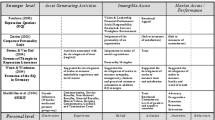Abstract
This paper draws on an economic/strategy perspective to address the relationship between corporate reputation and shareholder value. We argue that in selling a product or service or purchasing inputs, companies issue both explicit and implicit claims. The former refers to the contractual basis on which goods and services are sold or purchased by companies whereas the latter relates to company promises to stakeholders (employees, customers, suppliers, etc.) that are either too vague or too costly to specify in writing. Implicit claims reflect promises of quality, good working conditions, and service levels which are not explicitly stated in any contracts, but which, when present, permit a company to sell products and/or services at higher prices, and purchase goods and services from suppliers at lower prices than competitors. Implicit claims are not sold separately from the product, cannot be traded on a market, and hence have no legal standing. However, implicit claims do have economic value, and that value is reflected in the company's share price. Implicit claims have a value only if stakeholders believe that the company will honor them. It is in this context that reputation generates value to firms. By expending resources to fulfil implicit claims, a company can establish trust with its stakeholders that it will honor the implicit claims and hence confirm their value to stakeholders. Reputation is built by incurring expenditures in fulfilling promises of implicit claims and by signaling that future implicit claims will be honored. Corporate reputations affect a firm's ability to issue valuable implicit claims. By viewing reputation through the implicit claims perspective, management is presented with a framework that permits identification of the link between implicit claims, reputation, and shareholder value. Decisions can be made on the extent of investments to generate reputation and the responses to reputational threats. The next section describes the explicit and implicit claim scenario in more depth and relates it to academic literature. Section three demonstrates that conventional reputation literature describes reputation in terms of stakeholders' perceptions and that this analysis confounds implicit and explicit claims. Section four argues that the reputation impact on shareholder value is best viewed through the implicit claims perspective. By understanding the importance of implicit claims and the costs of building and maintaining reputation that facilitates issuance of these claims, managers can make informed decisions on reputation creation and maintenance. The last section discusses the implications of implicit claims for managing corporate reputation.
Similar content being viewed by others
Author information
Authors and Affiliations
Rights and permissions
About this article
Cite this article
devine, I., Halpern, P. Implicit Claims: The Role of Corporate Reputation in Value Creation. Corp Reputation Rev 4, 42–49 (2001). https://doi.org/10.1057/palgrave.crr.1540131
Published:
Issue Date:
DOI: https://doi.org/10.1057/palgrave.crr.1540131




